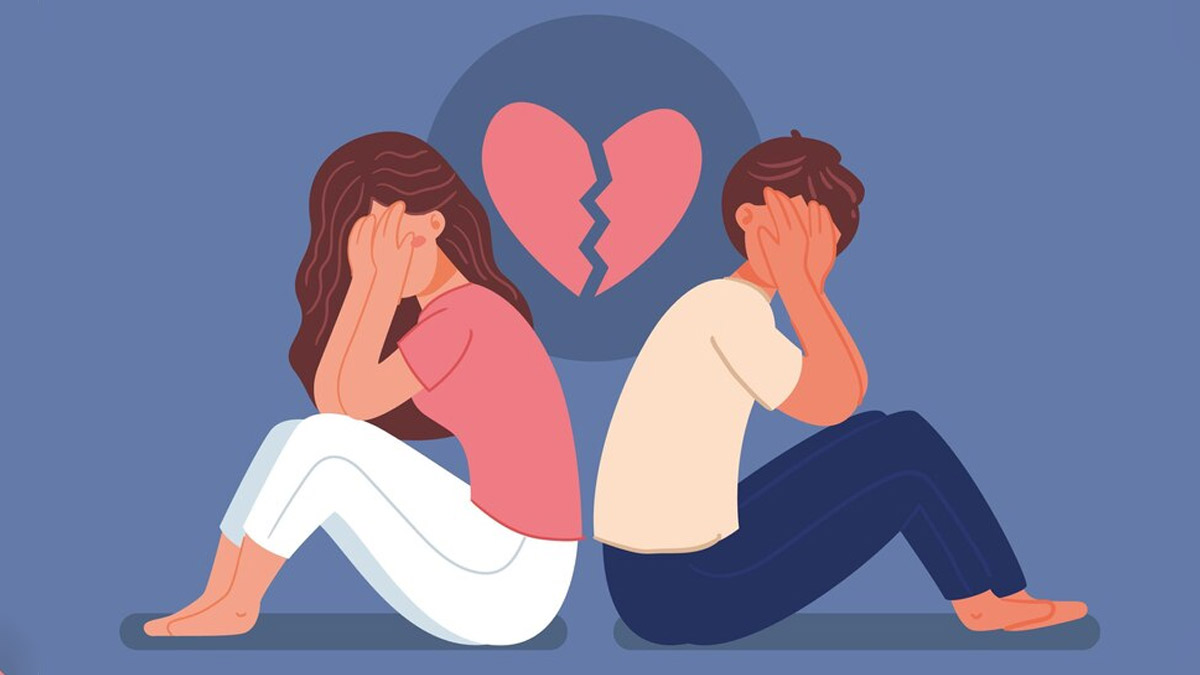
Breakups can be emotionally challenging, triggering a range of feelings from sadness and grief to anger and confusion. The end of a relationship not only affects your emotional well-being but can also impact your mental health. Understanding these effects and implementing healthy coping strategies are crucial for navigating through this difficult time.
Table of Content:-
Research published in the Journal of Family Psychology found that undergoing a breakup was linked to heightened psychological distress and reduced life satisfaction, as observed from before to after the dissolution of the relationship. To understand the mental and emotional impact of going through a breakup and a healthy way to move on, the OnlyMyHealth team spoke to Dr Sonal Anand, Psychiatrist, Wockhardt Hospitals, Mira Road.

Effects Of Breaking Up On Mental Health
Breakups can lead to a rollercoaster of emotions. Initially, there may be shock and denial, followed by intense feelings of sadness, loneliness, and even guilt. Some individuals experience anger or resentment towards their ex-partner or themselves. These emotions are natural reactions to loss and change, but they can take a toll on mental health if not addressed.
Dr Anand said, “How a person deals with a break-up depends largely on their personality, how they cope with stress, how good they are at moving on from heartbreak, and their ability to handle grief.”
“Not everyone will go through the same process. I have seen many patients who have absolutely no hang-ups, they will just jump to the next relationship easily,” she added.
However, for those of us who have a tough time post-breaking up, Dr Anand mentioned a few pointers about why break-ups are so emotionally challenging:
- One aspect of a break-up that affects mental health is that people often drown in a vicious cycle of self-blame and guilt. They believe that their relationship did not work because they are not good enough, or they made mistakes. But that is not the case, generally speaking. In any relationship, things are always two ways.
- Many patients suffer acute stress and grief after going through a break-up. This usually happens due to neurotransmitters like serotonin and dopamine getting depleted in the brain. These are called happy hormones, the lack of which makes people feel a sense of inertia. In simple words, they feel low.
- During a bout of acute stress, it induces a sympathetic and parasympathetic reaction. When a person goes into a sympathetic overdrive, their heart starts beating faster, their pupils get dilated, or their breathing gets faster. If this sympathetic overdrive because of acute stress goes on for a prolonged period, the body gets exhausted.
Also Read: Is Your Partner Emotionally Withdrawn? Expert Shares Probable Reasons And How You Can Help Them
How To Move On After A Break-Up?
The most important thing to remember is that it is normal to feel grief about the demise of your relationship. Take time to acknowledge and process your feelings. Give yourself permission to grieve the loss of the relationship and accept that it's okay to feel sad or upset. Dr Anand listed a few tips that can help you move on healthily:
- To cope with a break-up closure is important. Try having an amicable closure. Rather than blaming yourself, analyse what went wrong practically.
- Instead of jumping into the next relationship, take your time to heal.
- Social support also helps. The more you talk about your feelings, the earlier you heal.
- Exercising also helps a lot of people. Exercising in the morning especially releases endorphins, which help you feel better.
- Do not stalk your ex on social media. If you keep following up with their life directly, it will make it much more difficult for you to move on. So, be strict about how you use social media.
- Lastly, if you are at fault, instead of spiralling into self-doubt and blame, make efforts to forgive yourself.

Dr Anand concluded that a person’s response to heartbreak depends on how prone they are to depression and anxiety, their history of mental health issues, what sort of relationships they have had in the past, and most importantly the quality and length of the relationship they were in. So, if you are expecting a break-up or planning to break up with your partner, there is no need to feel anxious. Letting go is sometimes much more important. With a practical, resilient mindset, you can brave through the upsetting phase of moving on. However, if you are having an exceptionally tough time post-breakup, do not fret about seeking professional help.
Also watch this video
How we keep this article up to date:
We work with experts and keep a close eye on the latest in health and wellness. Whenever there is a new research or helpful information, we update our articles with accurate and useful advice.
Current Version